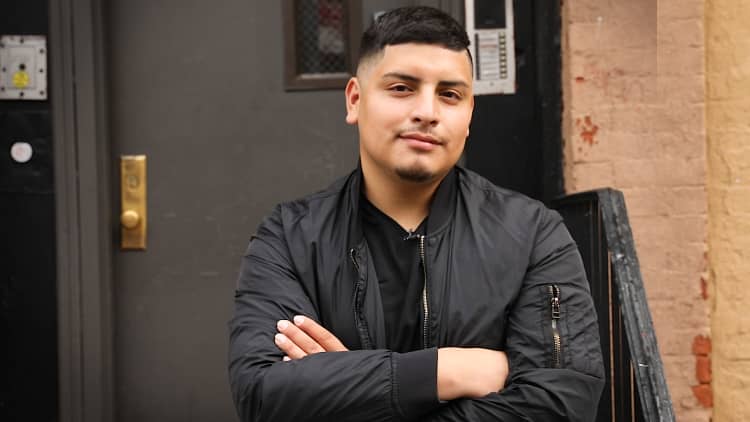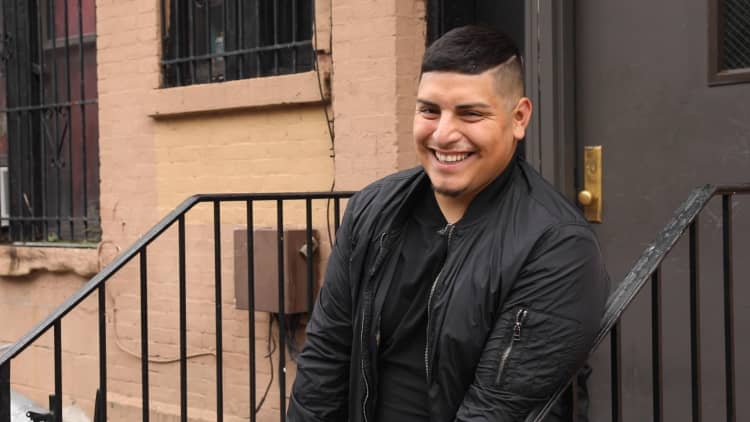This story is part of CNBC Make It's Millennial Money series, which profiles people around the world and details how they earn, spend and save their money.
In December 2019, Jesus Campos was working hard to make his financial dreams — including saving to buy a house his children could grow up in — a reality.
Once a high school dropout working as a cashier at a grocery store, Campos earned his GED at 19 and swapped the hourly work for a full-time job at a utilities company, which paid $80,000 per year, plus benefits. Eventually, he hoped to turn his Amazon side hustle into his full-time job so that he could set his own hours and work on his own terms. With his optimistic outlook and infectious good nature, it seemed a sure bet he would accomplish all that and more.
Then coronavirus hit New York, and the now-25-year-old's life changed dramatically. Over the course of a few weeks, he was furloughed from his job at the utilities company, and a member of his household contracted Covid-19, forcing Campos, like so many others in the U.S. and especially in hard-hit New York, to make some big life changes in the middle of a worldwide pandemic.
But Campos isn't one to let a few roadblocks derail him. The first task on the to-do list for his pandemic life: Establish a stable income. He is collecting unemployment, including the extra $600 per week for those who lost their job due to Covid-19, totaling $1,104 per week. But his family of four has many expenses, and so he's turned a side hustle into his primary job. Campos spends his days selling products on Amazon to cover the family's bills as he waits to hear when he can return to work at the utilities company.
Campos buys products, including everyday essentials ranging from toilet paper to peanut butter, from big-box stores like BJs and Target to resell on Amazon. He spends some days sourcing goods and stashes the products in a storage unit unit he sells them. Then, Campos and his wife, Carolina, pack and ship them. He sold around $100,000 worth of products in 2019; this year his sales have already topped $60,000, according to his seller's dashboard.
He says he's thankful he had his side business to lean on during his furlough. "It's going really well so far," Campos told CNBC Make It at the beginning of May, noting April was his biggest sales month to date.

Next on his to-do list: Find a place to live. To save money, he, Carolina, and their two children — Jayden, 6, and Milani, 2 — had been sharing a four-bedroom apartment in Williamsburg, Brooklyn, with four members of Carolina's family. But Campos's father-in-law became ill with coronavirus in mid-April, and the couple decided it was time to find a place of their own where they could properly socially distance. (His father-in-law has since made a full recovery, Campos says, but "it was a very devastating time.")
It's not easy to move in the middle of a pandemic, especially with a six-year-old who can't miss his home-school classes. But between reading lessons and Amazon shipments, Campos managed to find a safe, affordable apartment, and at the beginning of May, the family packed their belongings into a delivery van from the bakery belonging to Campos's grandparents and headed to Ridgewood, Queens for a new life.
The family's new two-bedroom apartment costs $1,500 a month, including utilities. It's considerably more expensive than what they were paying to live with Carolina's family, putting further strain on their already tight budget. But he and Carolina felt it was necessary for the health of their children, regardless of cost.
"I had to...make sure that my children have a place to be safe."
Campos still maintains a sunny outlook despite the many trials he's faced as a result of the coronavirus pandemic. In fact, he considers his current situation an opportunity, if not exactly a blessing. In April alone, the last month for which CNBC Make It has all of Campos's financial information, his Amazon sales reached $23,000. He took home around $3,000 of that, and the rest he reinvested in the business to buy more products he can resell.
Though Campos wasn't planning on moving until he had saved enough to buy a home, he is pleased that his children have more space to play in their new apartment.
"It's more children-oriented," he says of the Ridgewood neighborhood, noting the many parks nearby. "Here, they can run around."
How Campos's budget has changed during the pandemic
In December 2019, Campos's largest monthly expense was his Amazon business. That hasn't changed — he estimates he's spent around $20,000 on products to resell since the pandemic hit — but other parts of his life have changed significantly.
"Being unemployed and not really having the same amount of money coming in is difficult because I have to make the difficult decision where I tell [Jayden and Milani], 'I can't play with you,'" he says. "I have to work in order for us to have a place to sleep."
Here's a breakdown of his estimated monthly spending as of December 2019:
- Business expenses: $2,518 (products, shipping, storage unit, taxes)
- Insurance: $589 (car, health)
- Food: $500
- Rent: $480 (one bedroom in a four-bedroom apartment, utilities)
- Transportation: $456 (gas, lease)
- Debt repayment: $420
- Investments: $302 (401(k))
- Phone: $195
- Misc: $135 (entertainment, laundry)
- Subscriptions: $44
Here are his expenses as of May 2020:
- Rent: $1,500 (two-bedroom apartment, includes utilities)
- Insurance: $550 (car, health)
- Transportation: $466 (car, gas)
- Food: $400 (groceries)
- Phone: $195
- Entertainment: $150 (X-Box)
- Credit card debt: $109
- Wi-Fi: $50
- Subscriptions: $23 (Amazon Prime, Spotify)
While Campos is making more money in Amazon sales, he's also spending more on products. He tries to reinvest most of what he earns, keeping just enough profit to cover his family's expenses, but given the current situation, there's no longer a typical monthly amount that Campos spends on his Amazon business.
Before, he spent an estimated $2,000 on products, $201 on a storage unit, $150 on shipping and $167 on taxes each month; now, his spending on products vary drastically month to month. He also now employs a CPA, which costs an additional $300 every quarter, to look over his taxes.
Campos put his 401(k) and savings contributions on hold for now, until he can get back to his day job. The family also has cut down on eating out all together, aside from a few takeout orders when they first moved to the new apartment.
One big debt is off his plate: Campos repaid his 401(k) loan a few months ago, so he doesn't have to worry about that monthly expense anymore. And he's noticed that he is spending less money on frivolous expenses, like coffee and snacks at work, now that he's home with Carolina and the kids more.
"We can definitely budget a lot more efficiently now," he says.
Campos's plan for the future
The coronavirus pandemic has changed a lot of aspects of Campos's current life, but he still dreams of buying a home where Jayden and Milani can grow up. "My goal is not to stay here too long," he says of the Ridgewood apartment.
But this temporary home is not without its charms. Campos notes that he finally has space not only for his children to play and run, but to have his own desk where he can budget and make a savings plan for the future. In the Williamsburg apartment, there was barely enough room for all eight occupants, let alone an office space.
It may not seem like much to some, but for Campos it's the promise of better — and more spacious — things to come.
"Things have been really bad because of the virus getting into my father-in-law. But now he's better," he says. "We've gotten away from the worst, and we're getting into the better. At this moment in time, since we started moving in, things have just been getting better."
Don't miss: This 26-year-old hairdresser earned $280,000 before the coronavirus pandemic—here's how he's doing now
Check out: The best credit cards of 2020 could earn you over $1,000 in 5 years




